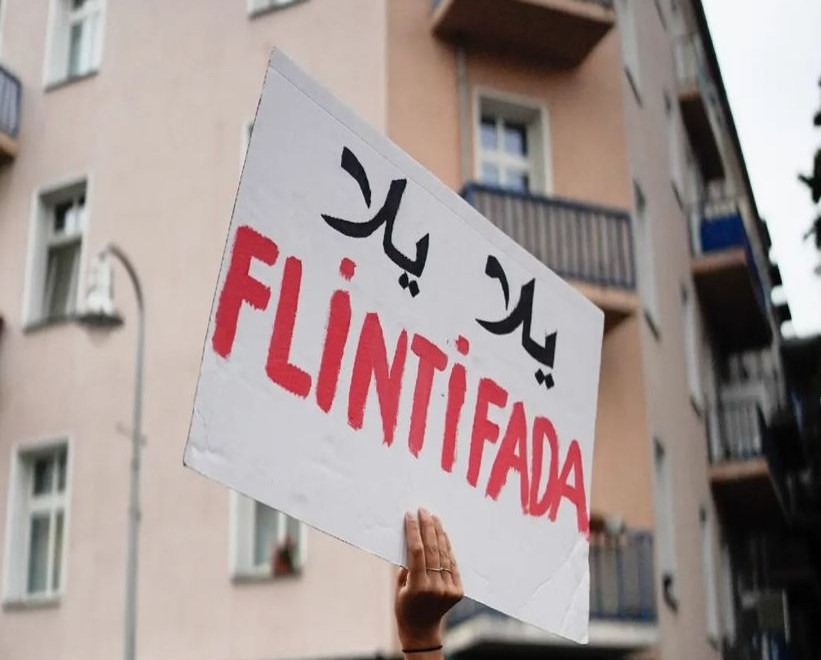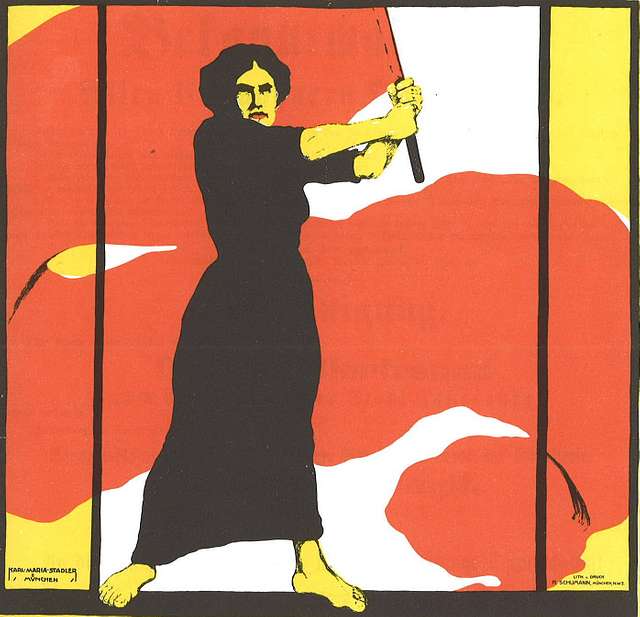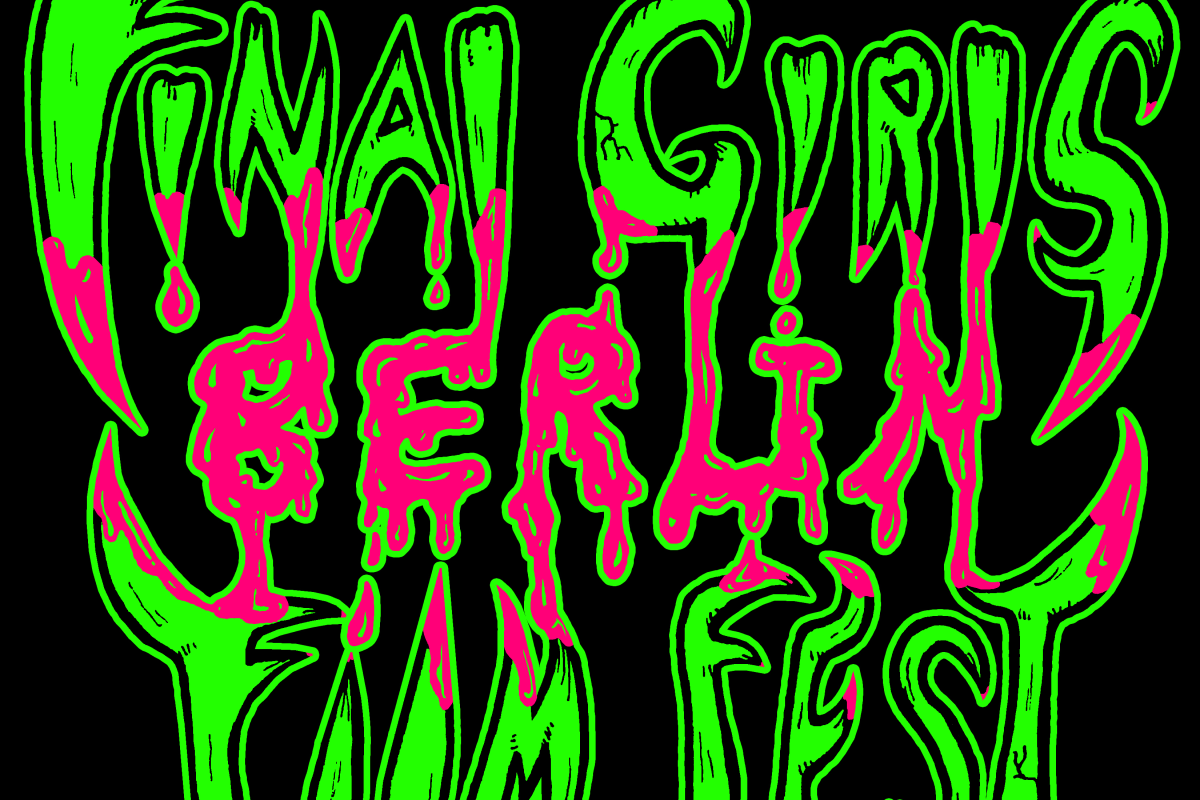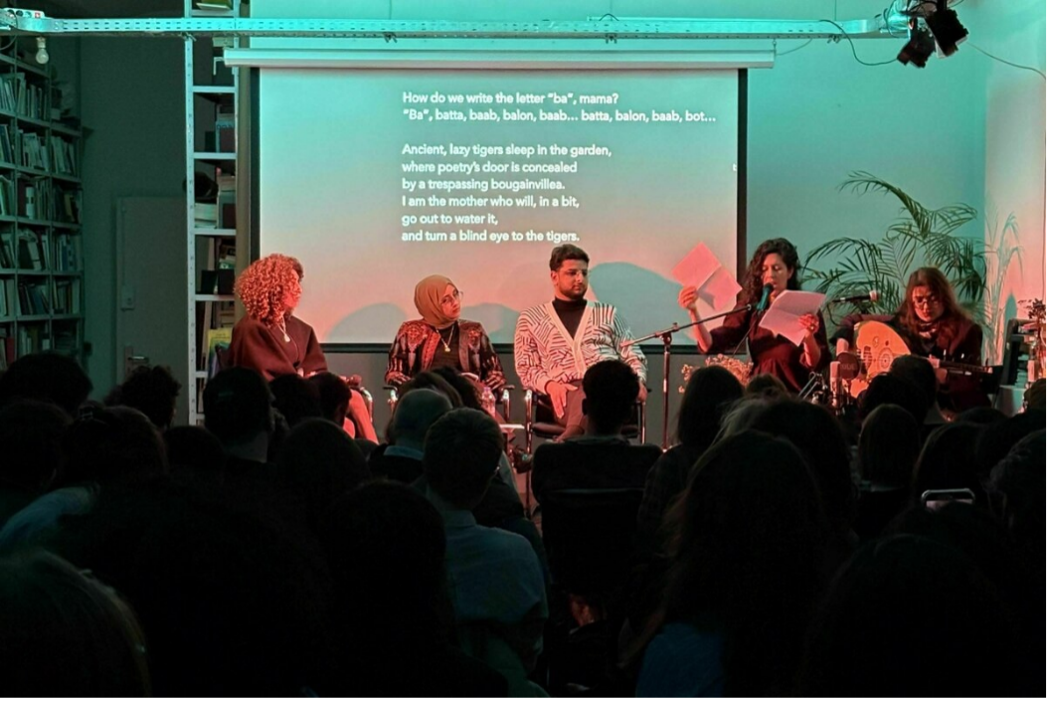July 26, 2024, Karl-Marx-Platz, Berlin Neukölln. I’ve arrived early, and now I am observing the changing scene, as more and more demonstrators are flocking in. I am equal parts tense and excited because the Dyke*March is not predictable. There are quite a few Kufiyas to be seen, but soon I also observe a small group at the corner of Karl-Marx-Straße who are holding up Zionist posters. And where is the Dykes4Palestine block that was announced on Instagram? Is it that group over there? Or the roughly equal-sized group over here?
“Excuse me,” someone asks me in German, “is this protest for Palestine?” “Well,” I say, and then I tell them what I know: that it’s a march for lesbian visibility and that the organizers made a statement condemning the genocide in Gaza.
Does a condemnation of the genocide make the Dyke March “for Palestine”? And what are we going to do about that Zionist corner over there?
There are all these uncertainties in the air.
Then it happens. There is motioning, we move over next to the van, and we erupt chanting Free-Free-Palestine from the depths of our lungs, and Zionism-Is-A-Crime, Yalla-Yalla-Intifada, Stop-the-Genocide, Freedom-for-Palestine, Freedom-for-Sudan, Freedom-for-Kongo, Freedom-for-Kurdistan and on and on. The energy is high. When one chant leader drops out, the next one picks up. We are many!
I also see those who are not chanting but watching us, calmly, their faces revealing nothing. They must be taking note in some way.
After maybe ten minutes we shout a last loud “Free Palestine” and then the air space is taken by an organizer’s voice resounding through a megaphone. The voice announces that the demonstration will start soon, and it reminds everyone that it is a demonstration for lesbian visibility. They also suggest that we should practice solidarity among each other. Somebody translates into English for their comrades, and they chuckle.
Apparently the intensity of Palestine solidarity messages overwhelmed at least this one organizer’s expectations and preferences.
The organizer’s lack of experience with Palestine solidarity also became apparent in a funny little moment when they had to read out the restrictions. Anybody who has been to the anti-genocide protests has heard these anti-Palestinian litanies that routinely remind us of the names of all the Palestinian factions that we are forbidden to support, among other things, before we get to have our demonstrations.
The Dyke* March organizer, unfamiliar with the procedure, approached the task by attempting to paraphrase the restrictions in their own words, integrating as it were their own political messaging with the restrictions on the right of assembly conveyed by the cops. The cops seemed not to appreciate the integrative gesture, though, as the organizer was interrupted and instructed that this is not how it goes, until they read the statement verbatim.
When the march started filling into Karl-Marx-Straße, the pro-Palestinian demonstrators walked ahead, and we took to chanting again. There were many cops lining the demo. At some point I dropped to the side, looking for my friend and demo buddy with whom I had failed to united with so far because of all the excitement on Karl-Marx-Platz. There was a strong presence of Palestine solidarity for as long as I could see, and I waited a few minutes, letting the march pass by.
“We ain’t family until Palestine is free,” read one memorable sign that spoke well to the Dyke* March setting and also resonated with its North-American connections, since it is in some North-American contexts that “family” is used among (mostly older generations of) queers as code for a shared fate of queers.
“FLINTIFADA” was penned on another sign, merging the German acronym FLINTA (which stands for Women-Lesbians-Inter-Nonbinary-Trans-Agender) with the Arabic intifada, meaning uprising.
Another prominent sign exhibited the ACT-UP slogan SILENCE = DEATH with a watermelon-themed graphic, placing the protest against the genocide of Palestinians in the tradition of protesting the AIDS crisis while highlighting the issue of silence and apathy among large groups of people. As the Jüdische Stimme für gerechten Frieden in Nahost pointed out, the disruptive actions of ACT UP against the AIDS crisis have impacted other protest movements since then and they are present in today’s anti-genocide protests. The New York City Dyke March, which the Dyke* March Berlin cites as in inspiration, was founded by activists from ACT UP and Lesbian Avengers among others. Fittingly, the New York City Dyke March this year marched under the theme “Dykes against Genocide.”
Dyke* March Berlin’s organizers did not adopt such a theme, but a rather large group of its participants did by means of the banners and slogans that we brought. It was the first time that I experienced Palestine solidarity to be dominant in a minimally defined leftist and/or queer space in Germany. Minimally defined in the sense that the Dyke* March has no elaborate political commitments. Very much unlike the Internationalist Queer Pride Berlin (IQPB), which was to take place the following day. IQPB has a clear position, equally put down in writing and born out in the living practice of organizing alliances, where unequivocal solidarity with Palestine is an integral part of a coherent anti-colonial, anti-capitalist internationalism.
The Dyke*March Berlin is different. Its goal is lesbian visibility. It takes no corporate or state funding. And it is trans-inclusive. That, in a nutshell, is it. There are no speeches and usually no long statements. It is a march followed by a party.
Yet, it also embraces the self-image as “a protest demo, not a parade.” And in any protest, the question what the protest is for or against, matters. The Dyke* March Flyer spoke only vaguely about “taking a stand against hatred”.
The condemnation of the genocide in Palestine came later, and not very prominently placed, in an otherwise untitled “Statement by the organisers on the solidarity bar at Möbel Olfe on July, 7th and on the Dyke* March Berlin 2024.” Summed up briefly, one learns that there was a fundraiser for the Dyke* March at the bar Möbel Olfe, which was ended early after a course of events that was provoked by a group of people who stickered Israeli flags, among other things, and declared their table a “safe space for Jews and Israelis.” The Dyke* March organizers condemn the “unannounced political action” of this group, accuse the group of wanting to provoke and divide, and blame it for the premature end of the fundraiser.
A statement by the anti-colonial feminist collective Perrxz der Futuro describes the course of events at said fundraiser differently. In a statement titled “No Dyke Pride in Genocide” they write this about the fundraising event:
“After several hours into the party, we noticed that, in a very visible space inside the bar, there was a table with five people with stickers, flyers and signs that said “No pride in Hamas”, ”believe Israeli women”, “safe table for Israelis”, among other things. The situation generated great alert in us so we sought to speak with the organizers of the Dyke march, who ignored us, did not give importance to the situation and referred us to speak with the people at the bar.”
The statement goes on to describe that the Dyke* March team later yelled at the anti-colonial group, while the Zionist group filmed the anti-colonial group and called the cops on them.
I conclude, or suspect, that there was some internal reckoning after the fundraiser on the part of the Dyke* March organizing team which led them to articulate a statement more critical towards the Zionist group, and more embracing of the anti-colonial feminist group than they had been in their actions on that evening. In that statement they also wrote down the following: “As we demonstrate on the streets of Berlin, we want to reaffirm our solidarity with marginalized, oppressed groups worldwide. We condemn the current genocide in Palestine and other parts of the world.”
Perrxs del Futuro comments as follows:
“In the light of the recent statement published by Dyke March Berlin, we believe that taking a stand is necessary, but not sufficient.
The fight against oppression, violence and genocide must be firm. It is not enough to declare it in writing, but to act accordingly.
Without the insistence on those of us who were alerted to the presence of Zionist propaganda in the place, neither the organization not the bar would have done anything about it.
It is not enough to denounce antisemitic attitudes, but also Zionist attitudes, calling them by name.
It is not enough to say that they are on the side of the oppressed, if at the moment when they are needed, they ignore us, mistreat and violate us.”
Many contradictions remain with the Dyke*March Berlin, as the statement of Perrxz del Futuro make clear. The insistence by a small group of anti-colonial feminists to challenge the Zionist propaganda at the fundraising event had a big effect. Without it, the Dyke* March team may never have published their condemnation of the genocide. Insufficient and shaped by contradictions as it was, this condemnation made a significant opening in the Zionist-dominated (queer/political) landscape in Germany and was likely motivating many pro-Palestinian lesbians, queers and trans people and our allies to come out and participate in the Dyke* March to protest for an end to the genocide.
The experience of the Dyke*March Berlin shows that the Zionist German ruling ideology is full of cracks, and that political spaces are capable of starting to rid themselves of it. Not being dependent on public or corporate funding may well have been a significant factor. I am convinced that a newly powerful Left (in Germany) will be anti-Zionist, or it will be non-existing. The experience at the Dyke March gave me hope that we may see the first, thanks to all the relentless acts of confronting and challenging and protesting in spaces big and small. Gaza is changing all of us.
There was brutal violence by cops and there were detentions. One widely circulated video captured a moving act of spontaneous, very soft-spoken solidarity with a detained protester: A young protester is pressed against the wall of a pharmacy in Karl-Marx-Straße while getting detained by a cop, and an older woman who was resting by the windowsill of the pharmacy comforts the protester by gently stroking and kissing her arm. With this scene I shall end my report.




